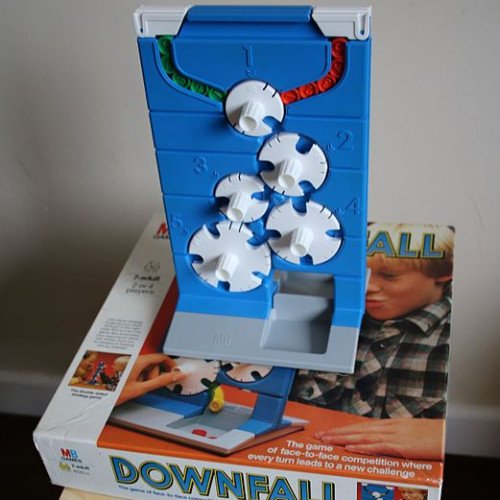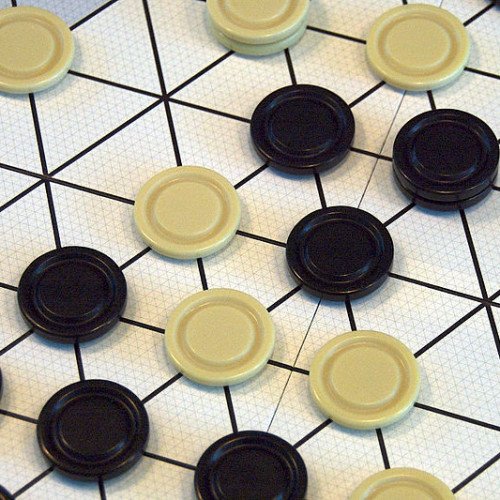DOWNFALL VS GIPF

DOWNFALL
Downfall is a two-player game for players aged 7 and older, first marketed by the Milton Bradley Company in 1970. The game consists of a vertical board with five slotted dials on each side. Each player starts with ten numbered tokens or discs at the top of the board. The object of the game is to move the discs to the bottom of the board by turning the dials. Players alternate turns moving the dials and cannot move a dial that their opponent has just moved. The winner is the first player to move all of their discs into the tray at the bottom. An advanced version of the rules dictates that the discs arrive in the tray in numerical order. Since neither player can see the other's board, it is common to inadvertently advance - or hinder - the opponent's gameplay. The game rewards forward thinking and planning; players may try to "trap" their opponent into turning a dial that will advance their own disc, while trying to ensure that their own discs are not caught and dropped out of order. The game is currently available in the UK under the name New Downfall, manufactured and marketed by Hasbro. The new version follows the same rules but has a more futuristic design in red and yellow. The game's box art is parodied on the cover of Expert Knob Twiddlers, an album by Mike & Rich (Mike Paradinas & Richard D. James).
Statistics for this Xoptio

GIPF
GIPF is an abstract strategy board game by Kris Burm, the first of six games in his series of games called the GIPF Project. GIPF was recommended by Spiel des Jahres in 1998. Players take turns pushing tokens (one player taking black, the other white) from the edge of the tri-gridded, hexagonal board, with pieces already in play pushed in front of the new placements rather than allowing more than one piece on any space. The game is lost if a player has no more tokens to play, and since each starts with a set number of tokens, it is clearly necessary to recycle pieces already positioned to keep playing. This is achieved by contriving to line up four pieces of the same colour in a row on the board, at which point those tokens are returned to their owner, and any opposing tokens extending from the line of four are captured. Because a single player will often move several pieces and change numerous on-board relationships, it is remarkably difficult to predict the state of the board more than one turn ahead, despite GIPF being a game of perfect information. Play tends to be highly fluid and there is no real concept of long term territorial or spatial development. The game can be expanded with extra pieces (available separately) called Potentials, which allow different kinds of moves to be made. These are named for the other games in the GIPF Project, though the other games are not actually necessary in order to utilise the Potentials named after them.